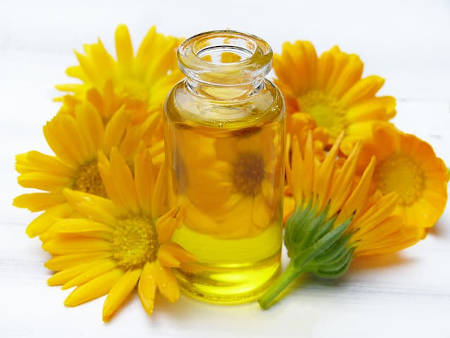Is it not a secret that nature produces wonderful medicines for health and beauty.
A good example is calendula, a plant that has powerful medicinal properties.
Calendula has many uses and it belongs to the same family as chamomile and sunflower.
Benefits of Calendula
The petals of the calendula plant, also known as marigold, have been used for medicinal purposes since the 12th century.
This plant is native to southern Europe, but today grows as an ornamental plant all over the world.
Calendula is an annual plant that blooms in almost any soil but can be found commonly in Europe, West Asia, and the United States.
The first settlers brought the plant to North America, and it became a favorite of gardeners.
Its name derives from the Latin word Kalendae, a Roman word that means an annual flower that grows in their area.
Calendula contains high amounts of flavonoids, which are plant-based antioxidants.
These flavonoids protect cells from damage caused by unstable molecules called free radicals.
Moreover, this plant fights inflammation, viruses, and bacteria.
Calendula has many healing properties due to the substances it contains.
Some of these substances are saponins, carotenoids, resin, essential oils, sterols, and flavonoids.
Tailor Treatment Strategy Using an Herbalist
First, it is important to note that calendula flowers are considered herbs.
Like any other herb, calendula is a natural remedy for many health conditions.
Therefore, before use (especially internal use) you should consult an herbalist to match the right treatment to your personal diagnosis.
A skilled therapist will make a differential diagnosis,
meaning he will differentiate between two or more conditions that could be behind your symptoms.
By doing so, he will be able to tailor the most accurate treatment to the specific condition,
Selecting the right medicinal plants out of hundreds of potential herbs.
Then, of course, he will recommend the appropriate method and dosages.
Main Medicinal Properties of Calendula

Uses of Calendula to Heal Skin Wounds
You can apply calendula oil, ointment, or infusion to the skin to treat burns, bruises, and cuts.
It also speeds up the healing process and fights minor infections.
Among its many uses, calendula cream is also good for the treatment of hemorrhoids.
Studies show that calendula helps heal a wound more quickly.
It does so by increasing blood flow to the affected area and helping the body create new tissue.
Homeopaths generally recommend the use of calendula ointment for healing sunburn and first-degree burns.
An effective treatment is to apply calendula oil, using a bandage, topically to the affected area.
Another method is to soak a cloth in a calendula infusion and apply it to the wound.
In addition, calendula is safe for use on children and pregnant women.
Uses of Calendula to Treat Skin Infections
Early scientific evidence suggests that calendula helps prevent dermatitis in cancer patients treated with radiation, compared to other creams.
Calendula ointment is also a safe and effective remedy for treating diaper rash.
In addition, you may use the plant infusion as an effective rinse to treat bee stings, eye infections, eczema, hemorrhoids, and also acne.
The flowers of the plant have antimicrobial properties, which improve blood circulation and lymph fluids and also help eliminate toxins from the body.
The Calendula’s extract helps in removing warts and healing mucous membranes and skin infections.
The Uses of Calendula Oil

Calendula’s common use is externally using its oil.
Its oil regenerates tissue, it is anti-inflammatory, anti-fungal, and has soothing properties.
It is also very safe for use.
Calendula oil is wonderful for the skin and may cure a wide range of skin problems.
It is good for healing wounds, burns, infections, scars, and sun damage.
In addition, this oil is very good for repairing surgical scars and radiation burnings.
Calendula oil is very effective in soothing skin allergies, and skin diseases such as eczema, asthma of the skin (atopic dermatitis), psoriasis, rashes, and skin irritations.
The oil is antifungal and therefore helps to treat skin fungus as well as vaginal fungus (Candida) for external use.
It helps suppress the fungus and also significantly relieves itching.
In addition, it is wonderful for restoring dry and cracked skin.
Due to qualities of the calendula, natural cosmetics is widely using it for healing, restoring, and nourishing the skin.
Uses of Calendula Oil for Children and Babies

Thanks to being a safe, effective, and subtle oil, it is commonly the main ingredient in products for babies and children.
Due to its anti-inflammatory, soothing, and anti-fungal properties, it is good for treating diaper rash, rashes, irritations, fungus, bites, sores, and more.
Over the years we have come to see that calendula oil helps significantly in many cases of children and infants suffering from atopic dermatitis and various skin irritations.



